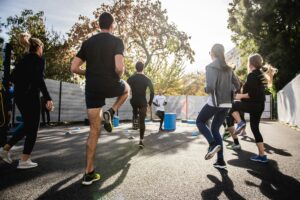If you’re chasing clearer focus and steadier energy, start with the simplest win in your kitchen: swap refined sugar for Health Garden’s clean, non-GMO sweeteners. Monk fruit and allulose keep glucose swings in check, while pure xylitol and erythritol deliver sugar-like taste in coffee, smoothies, and electrolyte drinks so your brain-fog plan stays delicious and dialed.
Brain fog feels like driving with the parking brake on—slow recall, scattered focus, low drive. The fix isn’t a magic pill; it’s a smart sequence. Exercise is often called the “magic pill” for healthy aging because it benefits almost every system, including cognition. Use that mindset here: master the basics, then layer nuance.
Safety note:
General education only. Get medical guidance first if pregnant/breastfeeding, underweight, with an eating-disorder history, diabetes, thyroid disease, anemia, complex meds, or persistent/severe symptoms. Stop any practice that worsens sleep, mood, dizziness, or performance.
The order that works
-
Sleep and light timing
Anchor wake time. Get outdoor light within 60 minutes of waking (5–15 minutes). Dim lights 90 minutes before bed. Aim 7–9 hours in a cool, quiet, dark room. Delay caffeine 60–90 minutes after waking; none after 2 pm. Clearer circadian rhythm = deeper sleep and steadier neurotransmitters.

-
Hydration and electrolytes
Start the day with 12–20 oz water plus a pinch of electrolytes (sodium/potassium/magnesium). Add another 12–20 oz mid-day. Mild dehydration alone can feel like brain fog.

-
Protein-forward, glycemic-calm meals
Breakfast with 25–40 g protein plus fiber (berries, chia, oats) stabilizes morning energy. Build plates around protein + fiber + healthy fat; cap ultra-processed snacks and late-night eating to reduce glucose swings. -
Aerobic exercise (Zone 2, 60-70% heartrate, first)
Zone 2: 30–45 minutes, 3–5 days/week (fast walk, easy jog, cycling; you can nasal-breathe and talk). Add 10–15 minute post-meal walks. Optional 4–6 short pick-ups (20–30 sec brisk, 60–90 sec easy) 1–2×/week. Expect better blood flow, BDNF, insulin sensitivity, and sleep quality.

-
Breathwork and mindfulness (fast state shifts)
Coherent breathing (~5–6 breaths/min) for 5–10 minutes before deep work. Physiological sighs (two short inhales, one long exhale) for quick downshifts. Box breathing 4-4-4-4 when overloaded. Mindfulness 8–12 minutes/day improves attention stickiness.

-
Gut-brain basics
Hit 25–35 g fiber/day from plants. Include fermented foods (yogurt, kefir, sauerkraut, kimchi) several times/week. If you suspect triggers, try a simple 2–4 week removal of alcohol, ultra-processed foods, and excess sugar; reintroduce one at a time. -
Gentle “cleansing”
Sweat on purpose (walks, cycling, light sauna 10–15 minutes to start—hydrate/electrolytes). Improve air quality (fresh air when possible, HEPA filtration, fix leaks). Plate helpers: crucifers (broccoli, arugula), citrus zest, garlic, green tea, and adequate protein to support detox enzymes. -
Fasting and meal timing—with a clear emphasis on water/juice fasting
Start with circadian 12:12 (finish dinner 12 hours before breakfast). If sleep and energy are solid, try 14:10 on non-hard-training days. Hydration is non-negotiable: water plus electrolytes throughout fasting windows.
-
Water fasting (short, strategic)
• Benefits many notice: smoother glucose/insulin dynamics, fewer morning decisions, a “cleaner” headspace.
• How to use it: occasional 24-hour water fast (early dinner to early dinner) no more than 1× every 2–4 weeks; keep workouts easy; break the fast with protein first.
• Abort if headaches, irritability, sleep disruption, or workout collapse appear. -
Juice fasting (vegetable-forward, low-glycemic)
• Benefits: hydration plus micronutrients and polyphenols; easier adherence for some than water-only.
• How to use it: 1 vegetable-forward juice day (1–3 juices, 12–16 oz each, spaced out) once every week or two. Favor low-sugar blends (celery, cucumber, leafy greens, lemon/ginger). If including fruit, keep servings small and pair with a short walk to blunt spikes.
• Consider broth-supported days as an alternative (mineral-rich, gentler on glucose). -
Dry fasting (no water)
• Not recommended for brain clarity. Dehydration increases cardiovascular and kidney strain and often worsens fog. If observed for cultural/religious reasons, keep durations short, avoid heat and hard training, and rehydrate promptly afterward. For cognitive benefits, choose water or vegetable-juice fasting.

-
Ancient modalities, modern precision
Ayurveda (dinacharya rhythm, oil pulling, gentle abhyanga, triphala for regularity), TCM (acupuncture for stress/sleep, qigong for breath-movement coherence), yoga nidra for deep restoration, sun salutations for warmth and focus, plus nature time, prayer/meditation, and gratitude journaling. These improve autonomic balance and sleep depth. -
Targeted micronutrients and gentle nootropics
Often-useful basics: magnesium glycinate (commonly 200–400 mg at night), omega-3s (EPA/DHA ~1–2 g/day), vitamin D if low, B12 if low, iron only if low, creatine monohydrate 3–5 g/day. Light cognitive stack: caffeine + L-theanine (e.g., green tea), bacopa monnieri, lion’s mane, or ginkgo (avoid with blood thinners). Add one at a time and reassess after 2–4 weeks. -
Environment and clinical checks
Musty odors, visible mold, or recent leaks warrant action. Persisting fog deserves evaluation for sleep apnea, thyroid issues, iron/ferritin, B12/folate, vitamin D, perimenopause/androgens, concussion history, medication effects, and mood disorders. Treat the root and fog often lifts quickly.
A one-page 7-day quick start
Day 1 Reset: morning light + water/electrolytes; protein breakfast; 10-minute post-meal walks; bedtime set; screen curfew 60–90 minutes.
Day 2 Glycemic calm: swap refined carbs for fiber + protein at lunch; coherent breathing 5 minutes pre-work; magnesium at night if appropriate.
Day 3 Gut-brain: add a fermented food; hit 25–35 g fiber; 20 minutes Zone 2.
Day 4 Juice day (optional): 2–3 low-glycemic, vegetable-forward juices or mineral broth across the day; steady water + electrolytes; evening walk; protein-first refeed at dinner if needed.
Day 5 Focus sprint: one 60–90 minute deep-work block with phone outside the room; 10–20 minutes strength training.
Day 6 Light fast: 12:12 or 14:10 with robust hydration/electrolytes; protein-forward first meal; 10–15 minute post-meal walk.
Day 7 Restore: nature walk or yoga nidra; review sleep, energy, and focus; keep the two biggest movers next week.
Tiny hinges that move big doors
- Morning light and hydration with electrolytes.
- Protein-forward first meal.
- Zone 2 aerobic exercise most days, plus short post-meal walks.
- One daily breathwork or mindfulness anchor.
- Simple, hydrated fasting window (water or vegetable-forward juices) that supports sleep and training.
- One plan, fewer decisions, better outcomes.
Build momentum this week with tiny, smart shifts. When energy and focus rise, double down on what worked. When they stall, change one variable—timing, protein, steps, or sleep. Hydrated fasting plus fundamentals keeps gains compounding.
Lock in your routine with sweetness that supports it. Stock monk fruit, allulose, xylitol, and erythritol so teas, juices, and post-workout snacks taste amazing without the crash. Explore the full lineup at healthgardenusa.com and make clean sweetness part of your daily clarity ritual.




